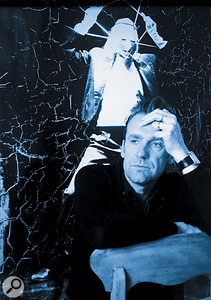What keeps us upgrading? Anxiety.
I own a piano featuring the words 'Berlin 1945' on the lid. I love that I have acquired one of the first positive things to emerge from Europe at the end of the war. It is not a great piano, but the optimism underlying the instrument ensures that it will never be sold.
It's almost 70 years old now and cannot be pulled back to concert pitch. It rests three quarters of a tone flat. I keep a glass of water behind the pedals on the tuners advice. "In order,” he advised, "to keep the old dear supple”.
I have a degree of anxiety about the piano. It resembles the guilty thoughts when contemplating elderly relatives. How much longer will she be playable? The anxiety relates to frailty, and as compensation I have affection for this particular piano that has grown over the years. It is the relationship a musician expects to have with their instrument.
 I have become aware, however, of a much more acute anxiety in the studio. It began when Apple announced Logic X. The requirement to generate complex bridging strategies to make 32-bit plug-in functionality available in a 64-bit host made me decide to step off the upgrade treadmill.
I have become aware, however, of a much more acute anxiety in the studio. It began when Apple announced Logic X. The requirement to generate complex bridging strategies to make 32-bit plug-in functionality available in a 64-bit host made me decide to step off the upgrade treadmill.
The moment I made this decision I experienced a period of euphoria. For a decade it has become an increasingly frequent aspect of my workflow that some piece of software required updating, or that new functionality required the upgrading of older hardware. The studio, consequently, has come to resemble a junk yard as much as a creative space.
By drawing this line I could theoretically deepen my relationship with the studio. I came to know and love the foibles and eccentricities of my signal chain in a way that had hitherto been lost in the compulsion to upgrade something as soon as I knew how to spell its name. I was developing the loving relationship I had come to cherish with my piano.
The euphoria was short-lived. Stopping time has the effect of pushing you towards a precipice. You can stand still on the edge for only so long, and the closer the driving force of technological advance gets, the more hysterical the situation becomes. Time is running out, and if you don't act now, everything will be lost.
The Mac, like all hardware designed with obsolescence in mind, can only last so much longer. What then? The new Pros don't allow for internal slot expansion, for starters. And that's just the beginning. Many of us are increasingly unsure of Apple's commitment to the professional enterprise market. All efforts seem to be focusing towards the playful hobbyist. Surely this explains why Logic appears to be turning into GarageBand, and all our tools are evolving into toys, optimised for cheap distribution on iOS, with exports targeted at compressed renders onto Soundcloud, rather than 24-bit heavyweights bound for a full mastering makeover?
Anxiety progresses towards panic. In the corners of the studio, where the dust is thick, I have failed back-up media of every description — floppies large and small, DAT tape, floating-point and solid-state external drives, DVDs, USB, Firewire (400 and 800), eSATA — all containing oceans of data, all of it inaccessible, all of it, in all likelihood, lost forever.
Will new hardware recognise archived software? Will my licences hold true in the crossover? Do the vendors even still exist?
Why go through all of this if Apple — the core, if you will, of my studio — drifts from a professional to consumer profile? Should I begin again as a helpless child with a PC and a copy of Cubase? What kind of hiatus in my output can I afford, and do I have a choice?
Any relationship is difficult to nurture when founded on doubt. We are continually caught up in some slutty 'sleep-around' paradigm where there is always much that is new and shiny to get excited about, but little opportunity to evolve emotionally deeper, more expressive relationships. I still look to the piano and feel hopeful that this ongoing rush for constant renewal will pass in favour of something more engaged. I have to, because at the present time, there is little else but hope — and my hard drive is starting to make a curious clicking sound.
About The Author
Michael Begg is an electronic musician, sound artist and producer based in East Lothian, Scotland. He is also an occasional contributor to The Quietus, and lectures, once in a while.
